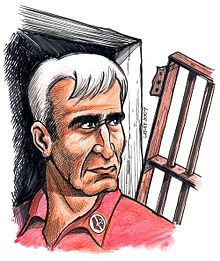Ahmad Sa'adat

Ahmad Sa'adat , also Achmed Sa'dat ( Arabic أحمد سعدات Ahmed Saadat , DMG Aḥmad Saʿdāt ; * 1953 in al-Bireh , West Bank ), is a militant Palestinian politician and prisoner. He is a member of the Palestinian Legislative Council and General Secretary of the Popular Front for the Liberation of Palestine (PFLP). He represents the right of return for all Palestinian refugees and their descendants.
Life
Ahmad Sa'adat was born in al-Bireh in 1953 . His parents had become refugees when the Israeli army destroyed their village, Dair Tarif near ar-Ramla, on July 13, 1948 and completely displaced the 8,000 inhabitants.
His political career began as a student in 1967, and in 1969 he joined the left-wing PFLP. In 1975 he completed his training as a math teacher in Ramallah. In 1976 he was imprisoned in Israel for four years. In April 1981 he was elected to the Central Committee of the PFLP, in March 1993 - while he was in Israeli "administrative detention" - d. H. Prison sentence without trial - found. In 1995/1996 he was arrested three times by the Palestinian Authority . He lived in al-Bira with his wife Abla and four children.
After Abu Ali Mustafa was deliberately killed with two rockets by the Israeli army in his office in Ramallah in the occupied West Bank , Ahmad Sa'adat was elected as his successor as General Secretary of the PFLP on October 3, 2001.
After the murder of Abu Ali Mustafa, PFLP activists killed the Israeli tourism minister, Rechaw'am Ze'ewi , founder of the right-wing party Moledet, in Jerusalem in October 2001 .
Ahmad Sa'adat was held responsible by the Israeli government for the murder of Rechaw'am Ze'ewi and was either arrested by the Palestinian Authority on January 15, 2002 at the instigation of the Israeli government or voluntarily went to the Muqataa , the official seat of Yasser Arafat , who initially refused to extradite Sa'adat to Israel .
After negotiations involving the United States and Great Britain , an agreement was reached between the Palestinian Authority and the Israeli government under Ariel Sharon . Sa'adat was tried by a Palestinian military tribunal in the Muqataa in March / April 2002 and taken to a Palestinian prison in Jericho on May 1, 2002 , where he was detained under the guard of US and British soldiers.
The Palestinian Supreme Court ruled that the act was against the Palestinian Constitution and ordered Sa'adat's release. The Palestinian Authority ignored the court ruling.
Human rights organizations such as Amnesty International stated that the trial of Sa'adat was not fair and that Sa'adat's detention would be illegal at the latest after the decision of the Supreme Court. He must either be charged and legally convicted or released immediately. Amnesty International called on the Israeli government to state publicly that if Sa'adat were released, it would not execute Sa'adat without a judgment.
Ahmad Sa'adat's younger brother Muhammad was killed by the Israeli army on August 20, 2002.
On March 14, 2006, British guards were withdrawn without explanation from the Jericho prison where Sa'adat was held. The US guards were not on duty. Twenty minutes later the prison was surrounded by the Israeli army. The Palestinian guards and some of the prisoners surrendered. Around 200 prisoners, including Ahmad Sa'adat, did not initially surrender. The Israeli army attacked the prison with tanks, attack helicopters and bulldozers, and about ten hours later Ahmad Sa'adat, five other inmates and over 200 Palestinian policemen were captured by the Israeli army.
British Foreign Secretary Jack Straw said that the British guards had been withdrawn for security reasons and that the procedure had not been discussed with the Palestinian authorities or the Israeli government.
Subsequent protests in the West Bank and Gaza Strip on March 15, 2006 attacked British facilities and kidnapped several foreigners.
On December 25, 2008, Saadat was sentenced by an Israeli military court to 30 years in prison, among other things for leading the fatal attack on Israeli tourism minister Rechaw'am Ze'ewi.
In August 2009, Ahmad Sa'adat was transferred from the isolation cell in Asqelan to the isolation wing of Ramon Prison in the Negev Desert.
Web links
- Ahmad Sa'adat must be released and his safety ensured ( Memento of August 11, 2006 in the Internet Archive ) ( Amnesty International , June 13, 2002)
- PFLP leader remains in prison, despite orders for release ( IMEMC / Maan , January 15, 2006)
- "Gaza is becoming a large prison under Israeli control" Interview with Ahmad Saadat ( Intifada , September 29, 2005)
- A democratic system for all of Palestine Interview with Ahmad Saadat ( SoZ , March 2003)
- Monitors in a Jericho jail How British and American wardens came to be supervising six men wanted by Israel ( The Guardian , March 14, 2006)
- Prison attack: Israeli aggression, British betrayal by George Galloway ( IMEMC , March 15, 2006)
Individual evidence
- ↑ Palestinian Constitution: "2003 Amended Basic Law" ( Memento of January 18, 2012 in the Internet Archive ).
- ^ Radical Palestinian leader Saadat condemned , tagesspiegel.de , December 25, 2008
| personal data | |
|---|---|
| SURNAME | Sa'adat, Ahmad |
| ALTERNATIVE NAMES | أحمد سعدات (Arabic); Sa'adat, Ahmad; Saʿdāt, Aḥmad; Saadat, Ahmed; Sa'dat, Achmed |
| BRIEF DESCRIPTION | Palestinian Politician (PFLP) |
| DATE OF BIRTH | 1953 |
| PLACE OF BIRTH | al-Bireh , West Bank |